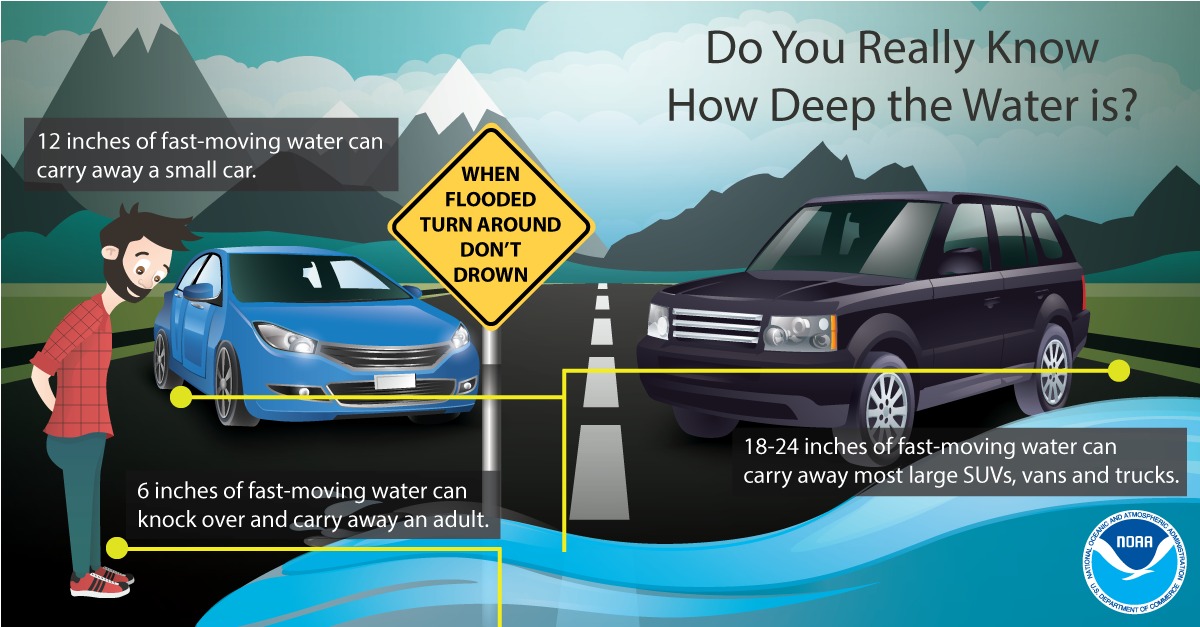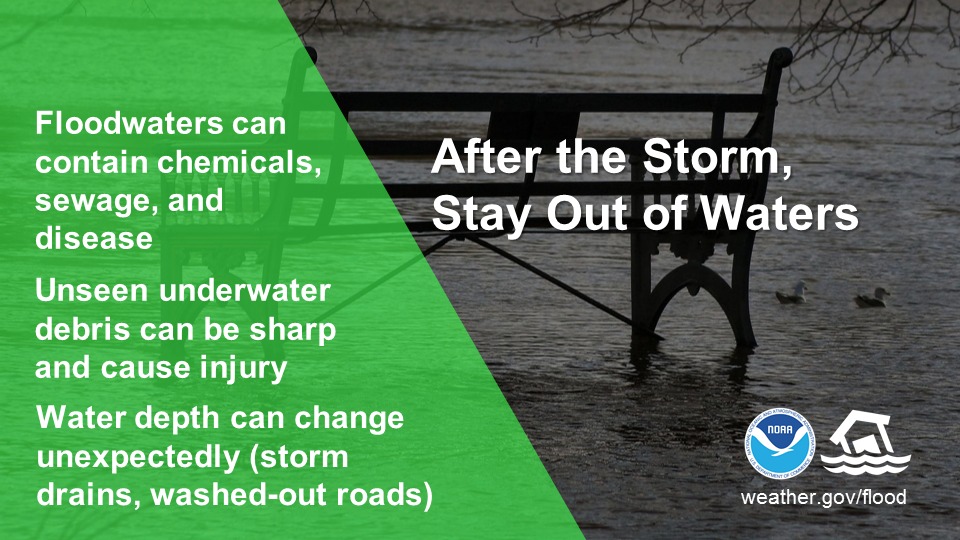Flooding can occur without warning and is especially dangerous for several reasons. It can wash away vehicles and mobile homes and cause extensive property damage. Seniors and individuals who need special assistance or cannot swim face a heightened risk of drowning. Finally, downed power lines can fall into pools of water and cause electrocution.
Familiarize yourself with the following terms to stay alert and prepared:
Flood/Flash Flood Watch - Be Aware!
- Conditions are favorable for flooding in the next day or two. Flash floods occur very quickly, usually as a result of heavy rainfall in a short period of time.
Flood Warning - Take Action!
- Flooding is expected to threaten life and property a few hours after the onset of heavy rain, ice jams, reservoir releases or snow melt. Flood warnings may be in effect for days or even weeks depending on weather and soil conditions, land topography, and river size.
Flash Flood Warning - Take Action!
- Rapidly rising water poses an immediate threat to life and property within a few hours due to a small stream or urban flooding and dam or levee failures. Quickly move to higher ground or stay away from flooded areas - especially in vehicles.

Before a Flood
- Avoid building in a floodplain unless you elevate and reinforce your home.
- Elevate the furnace, water heater, and electric panel if susceptible to flooding.
- Install check valves in sewer traps to prevent floodwater from backing up into your home.
- Construct barriers (levees, beams, sandbags, floodwalls) to stop floodwater from entering the building.
- Seal walls in basements with waterproofing compounds to avoid seepage.
- Keep an adequate supply of food, drinking water, and flashlights (with extra batteries) in case you are trapped inside your home.
During a Flood
- Seek higher ground. Do not wait for instructions.
- Be aware of flash flood areas such as canals, streams, drainage channels, and underpasses.
- Be ready to evacuate with your Emergency Supply Kit.
- If time allows, move essential items to the upper floors.
- If instructed, turn off the main valves and switches. Avoid electrical equipment if you are wet or standing in water.
- If you must leave your home, do not walk through moving water. Six inches of moving water can knock you off your feet.
- Do not try to drive over a flooded road. If your vehicle stalls, abandon it immediately.
After a Flood
- Avoid floodwaters. Do not let children play in the water.
- Be aware of areas where water has receded. Roadways may have weakened and could collapse.
- Avoid downed power lines and muddy water where power lines may have fallen.
- Return home only when authorities say it is safe to do so.
- Discard food that may have been contaminated.
- Check on sewage systems. If damaged, these can be a serious hazard
Important Links for Preparing for a Flood
- Flood Facts and Safety Tips
Flooding is Indiana's number one natural disaster occurrence. Floods and flash floods can happen during any season, at any time. Most communities in the United States can experience some kind of flooding after spring rains, heavy thunderstorms or winter snow thaws. Floods can be slow or fast-rising, but generally develop over a period of days. Flash floods usually result from intense storms dropping large amounts of rain within a brief period. Flash flooding can occur with little or no warning and can reach its peak in only a few minutes.
- Emergency Information
Flood waters can be extremely dangerous. The force of six inches of swiftly moving water can knock an adult person off his or her feet. The best protection during a flood is to leave the area and seek shelter on higher ground.
Flash flood waters move very quickly and can roll boulders, tear out trees, destroy buildings, and obliterate bridges. Walls of water can reach heights of 10 to 20 feet and generally are accompanied by a deadly cargo of debris. The best response to any signs of flash flooding is to move immediately and quickly to higher ground.
Just two feet of moving water can float and carry away most vehicles, including sport utility vehicles (SUVs) and pickup trucks. You can protect yourself best by being prepared and having time to act.
- Before a Flood
- Check with your local floodplain administrator to determine if you live in a flood-prone area to review the flood map for your property online.
- Consider installing check valves in building sewer traps to prevent flood waters from backing up in sewer drains.
- Plan and practice an evacuation route.
- Have disaster supplies on hand.
- Develop an emergency communication plan.
- Make sure all family members know how to respond in case of a flood.
- During a Flood Watch
- Listen to a radio or television for the latest storm information. Be prepared to evacuate.
- Fill bathtub, sinks and jugs with clean water in case water becomes contaminated.
- Move valuable household possessions to upper floors or to safe grounds if time permits.
- If you are instructed by local authorities, turn off all utilities at the main power switch and close the main gas valve.
- During a Flood Warning
- Evacuate areas that are subject to flooding. This includes dips, low spots, canyons, washes, etc.
- If driving, be aware that the road bed may not be intact under flood waters. Turn around and go another way.
- NEVER drive through flooded roads or low-water crossings. If your vehicle stalls, leave it and seek higher ground. Rapidly rising waters may engulf the vehicle and sweep it away.
- If camping, choose campsites along waterways with care. Remember that storms that are miles away could bring raging water your way.
- If indoors, turn on a battery-powered radio or NOAA Weather Radio to get the latest emergency information. If your area is advised to evacuate, do so immediately.
- If advised to evacuate, do so immediately. Listen to a battery-powered radio for instructions. Follow recommended evacuation routes. Shortcuts may be blocked.
- After a Flood
- Flood dangers do not end when the water begins to recede. Listen to a radio or television and do not return home until authorities indicate it is safe.
- Remember to help those who may require special assistance: infants, young children, the elderly, and people with disabilities.
- Before entering a flood-damaged building, check the foundation for cracks and inspect porch roofs and overhangs to be sure they are adequately supported. Ask a building inspector to check the house before you go inside.
- Be alert for gas leaks. Do not strike a match or use open flame when entering a building unless you know the gas has been turned off and the area ventilated.
- Do not use appliances/motors that were flooded unless they have been taken apart, cleaned, and dried.
- Don’t let children drink or put toys in flood waters. Don’t allow your children to play or swim in flood waters. If your child shows any signs or symptoms of illness after being in flood waters such as nausea, vomiting, or diarrhea, contact your physician as soon as possible.
- If a person receives a cut, burn, or puncture wound, make sure it does not come in contact with flood waters. Flood water may contain various bacteria, viruses, and other infectious organisms that may cause disease. Flood water may also contain fecal material from overflowing sewage systems. If you are concerned about an injury, check with your physician to see if a tetanus booster is necessary.
- Cleanup
- Mold is a likely problem in flooded homes. It is important to remove all water and fix any leaks before cleaning. Clean hard surfaces with a solution of bleach and water; make sure to ventilate the area when using chlorine bleach. Wear a filter mask and gloves to avoid contact with the mold. Let the bleach and water sit for 15 minutes and then dry the area thoroughly. Wet, porous materials, such as carpeting, wallboard, insulation, wallpaper, and furniture should be discarded because they remain a source of mold growth.
- Use fans and dehumidifiers to air and dry out the home. If possible, open doors and windows.
- Food Safety - Food that comes in contact with flood water can also pose a serious health risk. Throw away any product if there is any doubt about its safety. Throw away home-canned goods if the tops have been exposed to flooding. Food in paper containers, cloth, or cardboard packaging that has been exposed to flood water should also be discarded, along with soft drinks and condiments using capped containers. Store-bought canned goods may be saved if they are disinfected prior to opening. Label the can with a waterproof marker, remove the paper label, and wash the can thoroughly in hot, soapy water. Rinse well; after washing and rinsing, disinfect the can by soaking it for five minutes in a chlorine solution using one tablespoon of bleach (labeled 5.25 percent sodium hypochlorite) for each gallon of cool water.
- Water Safety - If you have a private well, run cold water for about 30 minutes to allow the well to recharge naturally. Do not save the water. Have the well disinfected and tested before drinking or using it for cooking. If you must use tap water, boil it vigorously for at least one minute. If you cannot boil it, add 16 drops of bleach to each gallon of water. Mix thoroughly and allow to stand for 30 minutes. This method should be used only with water that is clean in appearance and free of odors.
- Flood Terminology
- Flood – A condition that occurs when water overflows the natural or artificial confines of a stream or body of water, or accumulates by drainage over low-lying areas.
- General River Flooding – follows heavy rain, snow melt or their combination. While river flooding typically occurs slowly, allowing more time to take protective measures, extreme flash flooding or a breakup of an ice jam along a river can produce more rapid river rises.
- Urban and Small Stream Floods – occurs when heavy rain falls, resulting in flooded streets, underpasses or drainage ditches in urban areas, and creeks in rural areas. Not usually life-threatening on its own, but can be, if motorists drive through a flooded roadway or children play near a storm drain or drainage ditch.
- Flash Floods – Rapid and life-threatening floods from heavy rains occurring in a short period of time, usually in hilly or mountainous areas, or produced by the failure of a dam.
- Flood/Flash Flood Watch – Usually issued for several hours indicating that conditions are favorable for possible flooding or flash flooding.
- Flood/Flash Flood Warning – Issued when flooding or flash flooding is imminent or occurring. This indicates a need to take protective measures.

